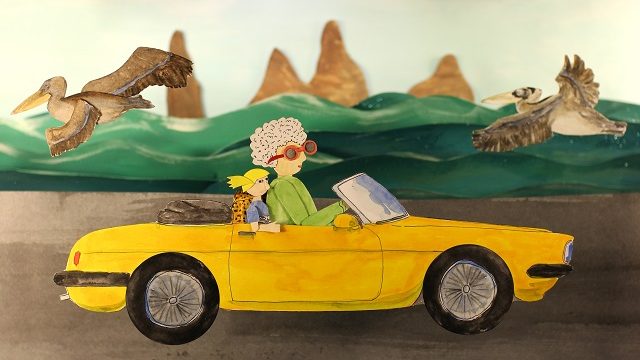Clyde Petersen was a 12-year-old living with his grandmother when his schizophrenic mother uprooted him and took him on a cross-country road trip. She took him away from everything familiar – boring dinners, Star Trek reruns, cat puzzles – and replaced it with Whitney Houston concerts and desert camping with hippy cults. Clyde’s mother uses the opportunity to try teaching Clyde, still gendered as a female, how to be a proper woman. She fights with Clyde on wearing feminine clothing and tries passing along the accepted tradition of leg shaving. On the edge of puberty, Clyde had already started experiencing gender dysphoria and begins his journey as a man.
From the car window, everything passes by in broad strokes. Being kidnapped by your mother and coming into your sexual identity are two powerful landmarks in a queer kid’s life. Though these events are not easily forgotten, we remember in broad emotional strokes rather than exacting detail. Grandma chain smokes in the car outside Clyde’s school until she disappears in a cloud of smoke. Rather than forcing every character to tell us exactly how they’re feeling at every moment, all conversations are replaced by symbolic representations. When anybody gets mad, angry tigers come out of their mouth to scratch at the other character.
Torrey Pines’ paper puppetry recalls the innocence of childhood. The rough edges of the world hint that young Clyde hasn’t quite grasped the details of life. Unfinished marker strokes commit to an adolescent expressionism more interested in depiction than exacting recreation. Layered landscapes reveal a larger and deeper world on the brink of discovery. Waves of water crash against each other, fields of grain move with a depth, and the desert sky reddens as the sun sets behind the painted rock formations.
As a movie about one’s own childhood, slavishly in dept to the 1990s, Torrey Pines is necessarily drenched in nostalgia but also focused on how our culture builds our selves. Young Clyde watches Beauty and the Beast, Murder She Wrote, and Star Trek. He remembers wanting to make out with Dianna Troi. They play on a Casio keyboard and learn how to play Heart and Soul while replacing all the notes with the word “butts.” In Torrey Pines, nostalgia for past media isn’t just about remembering old and outdated things, but also how they influenced our lives.
Clyde escapes from the world by crawling into cardboard forts built from boxes freed from a nearby dumpster. Flights of fancy replace group interaction. Cities and landscapes passing outside the car hint at the size of the world and its possibilities. Despite the specificity of the story, Torrey Pines communicates a transgendered adolescent experience with a universal language. With immaculately designed breathtaking visuals, Petersen invites us into his world and the moment that changed his world.
Torrey Pines opened Twist 2016: Seattle Queer Film Festival, and included a live accompaniment by Clyde Petersen, Earth, Kimya Dawson and The Beaconettes. There will be an encore presentation with pre-recorded audio on Saturday, October 22nd.
Clyde Petersen and his band Your Heart Breaks will be on tour with the film for the next month and a half, with a screening almost every day around the country (and even into Canada). Check out Torrey Pines’ schedule at its website. You should see if its coming near you.
Torrey Pines (Official Trailer) from Do it for the girls on Vimeo.


